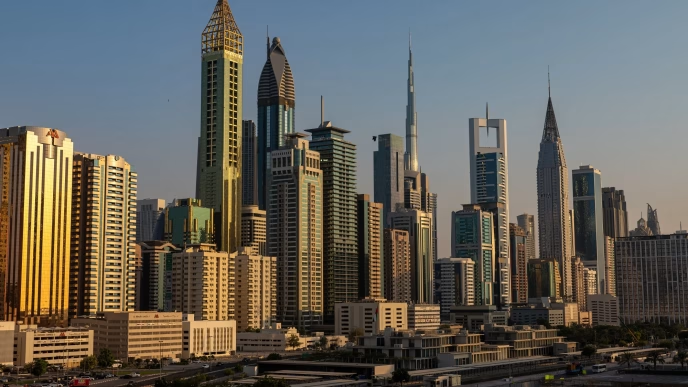In a forward-thinking and high-level meeting that underscored the UAE’s ambition to remain a global leader in innovation and sustainable urban growth, Dr. MAC Munir Ahmad Chaudhry, Group CEO of Al Maktoum Holding Group, engaged in an inspiring discussion with His Highness Sheikh Abdulhakim Al Maktoum and Mr. Ki Hong Miao on the future of smart cities and community development.
The event, described by attendees as both visionary and strategic, centered on the intersection of technology, sustainability, and human-centered design — elements seen as essential to shaping the cities of tomorrow.
A Vision Rooted in Innovation and Purpose
Dr. MAC Munir Ahmad Chaudhry, recognized for his global perspective on economic transformation and infrastructure innovation, emphasized that smart cities are not simply about advanced technologies but about creating resilient, connected, and inclusive communities.
“Smart development must go beyond digitalization,” Dr. Munir explained. “It must empower people, integrate sustainability at every level, and align with a shared vision for humanity’s progress.”
Under his leadership, Al Maktoum Holding Group has been expanding its influence across multiple sectors — from real estate and energy to digital technology and green infrastructure. The Group’s ongoing projects are designed to foster sustainable urban ecosystems, leveraging cutting-edge technologies such as AI-driven infrastructure management, renewable energy integration, and intelligent mobility solutions.
Sheikh Abdulhakim Al Maktoum’s Vision for Connected Communities
His Highness Sheikh Abdulhakim Al Maktoum reaffirmed the UAE’s long-standing commitment to innovation, sustainable urban planning, and international collaboration.
“Smart cities represent the next phase of human progress,” Sheikh Abdulhakim stated. “They are about connecting people, ideas, and opportunities in a way that enhances quality of life while protecting our environment.”
He emphasized that community well-being must remain at the center of every smart city initiative. Beyond the technological frameworks, the human element — education, cultural harmony, and accessibility — will define the success of future urban developments.
Building Partnerships for Global Impact
The meeting also highlighted the role of global partnerships in advancing urban innovation. Mr. Ki Hong Miao, a leading figure in international business strategy, discussed how collaborative efforts between the public and private sectors can accelerate progress in smart city infrastructure.
“Smart cities are global endeavors,” Miao noted. “They rely on cooperation between technology leaders, policymakers, and local communities. Together, we can create models that can be replicated across borders — ensuring progress that benefits everyone.”
This spirit of collaboration mirrors the UAE’s approach to growth: leveraging innovation not only as a national driver but also as a platform for international partnership and shared prosperity.
Al Maktoum Holding Group’s Role in the Future of Smart Cities
Under Dr. Munir’s guidance, Al Maktoum Holding Group is actively positioning itself as a catalyst for change in urban innovation. The company’s initiatives focus on integrating digital infrastructure, sustainable design, and advanced data systems to optimize city management and resource allocation.
One of Dr. Munir’s flagship goals is to transform traditional city planning into intelligent, adaptive ecosystems capable of responding dynamically to population growth, environmental challenges, and evolving economic trends.
“Smart cities must be designed to think, adapt, and evolve,” he said. “They must be capable of learning from data and improving themselves over time — reducing waste, enhancing connectivity, and supporting long-term sustainability.”
The Group’s vision aligns closely with the UAE’s national development goals, particularly those outlined in the UAE Vision 2031 and the Dubai Smart City Initiative, both of which prioritize sustainability, innovation, and global competitiveness.
Technology and Humanity in Harmony
A recurring theme of the discussion was the balance between technological advancement and human experience. Dr. Munir, Sheikh Abdulhakim, and Mr. Miao collectively stressed that future urban models must promote harmony between digital transformation and the cultural, social, and emotional dimensions of community life.
“Technology should never replace humanity — it should enhance it,” Dr. Munir remarked. “The true measure of a smart city is how intelligently it serves the people who live in it.”
Their shared vision includes cities that utilize data and automation not merely to improve efficiency but to enrich human potential — through better healthcare systems, education, green mobility, and cultural inclusivity.
A Unified Vision for the Future
The dialogue concluded with a strong sense of shared purpose. All three leaders emphasized the need for long-term strategies that integrate innovation with social responsibility, ensuring that urban development contributes positively to both local and global communities.
Their collaboration marks an important milestone in the evolution of the region’s approach to urbanization — one that blends strategic foresight, technological leadership, and community well-being.
As Dr. Munir put it, “Our mission is not only to build smart cities — it is to build smart societies. Cities that learn, grow, and inspire. Cities that make life better for every citizen.”
Looking Ahead
The meeting between Dr. MAC Munir Ahmad Chaudhry, Sheikh Abdulhakim Al Maktoum, and Ki Hong Miao represents more than just a discussion — it reflects a commitment to shaping the next chapter of urban development.
With Al Maktoum Holding Group at the forefront of transformative projects, the UAE continues to set a global benchmark for sustainable, human-centric innovation.
In a world racing toward digital transformation, the collaboration between these visionary leaders signals that the cities of tomorrow will not just be smarter — they will be more connected, compassionate, and enduring.
















